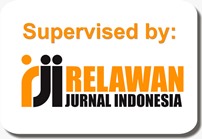THE EFFECT OF TEAM ORIENTATION, CREATING CHANGE AND CUSTOMER FOCUS ON INNOVATION AND EMPLOYEE PERFORMANCE ON PT. PELINDO III (PERSERO) BANJARMASIN
Abstract
Keywords :Team Orientation, Creating Change, Customer Focus, Innovation, Employee Performance
Full Text:
PDF (Bahasa Indonesia)References
Bernardin H. John and Russel, Joyce C.A. (1993). Human Resources Management: An Experimental Approach, Mc.Graw Hill Inc, Singapura.
Bolino, M. C., & Turnley, W. H. (2003). Going the extra mile: Cultivating and managing employee citizenship behavior. Academy of Management Executive, 17, 60–71.
Cameron KS, Quinn RE. (2006). Diagnosing and changing organizational culture: Based on the competing values framework. San Francisco: Jossey‐Bass.
Chatman, J. A., & Jehn, K. A. (1991). Assessing the relationship between industry characteristics and organizational culture: How different can you be?. Academy of Management Journal, 37, 522–553.
Denison and Mishra. (1995). Toward a theory of organizaational culture and effectiveness. Organizational Science, 6(2), 204-223.
Dama, Jihanti; Ogi, W.J. Imelda. (2018). The Influence Of Innovation And Creativity On Employee Performance At Bank Mandiri (Persero) Tbk Manado. Jurnal EMBA. Vol. 6, No.1, Hal 41-50.
Denison. (1996). What is the difference between organizational culture and organizational climate: A native’s point of view of a decade of paradigm wars. Academy of management review, 21 (3), 619-624.
Erdogan, Berrin, Liden, Robert C dan Kraimer, Maria L. (2006). Justice and Leader-member Exchange: The Moderating Role of Organization Culture. Academy of Mangement Journal, Vol 49, No 2, 395 – 406.
Ferdinand, Augusty. (2005). Structural Equation Modeling Dalam Penelitian Manajemen, Aplikasi Model-Model Rumit Dalam Penelitian Untuk Tesis Magister dan Disertasi Doktor, Seri Pustaka Kunci, Badan Penerbit Universitas Diponegoro, Semarang.
Johannessen, J., Olsen, B., and Lumpkin, G.T. (2001). Innovation as newness: what is new, how new, and new to whom?, Vol. 4 No. 1, pp. 20-31.
Miles, S. J., & Mangold, G. (2005). Positioning Southwest Airlines through employee branding. Business Horizons, 48, 535–545.
Riansyah, Rifky dan Sya’roni, A Wahab Deden. (2017). Faktor – faktor Yang Mempengaruhi Kreatifitas dan Inovasi Serta Implikasinya Terhadap Kinerja Karyawan Pada Konsultan Perencanaan dan Pengawasan Arsitektur Di Kota Serang. Jurnal Ilmiah Magister Manajemen UNIKOM, Vol 2 No 1.
Riduan, 2003. Dasar-dasar Statistika, Edisi revisi, Cetakan Ketiga, Alfabeta Bandung.
Soedjono, (2005). Budaya organisasi terhadap pegawai. Jakarta : Ghalia Indonesia.
Suyadi Prawirosentono. (2008). Kebijakan Manajemen Sumber Daya Manusia.
Tiqwani, Rerry, W Wijayanti Tri Dewie. (2014). Pengaruh Kepemimpinan dan Budaya Inovatif Terhadap Kinerja Karyawan. Jurnal Ilmu Manajemen: Vol (2), No 3.
Tuan, Nham Phong, Trang Pham Thi, MaegawaYoshikazu. (2015). The Relationship Between Organizational Culture And Innovation Through Vietnamese Employee’s Perpective.
Tuan, Nham Phong. (2014). The Impact Of Organizational Culture On Innovation Activities – The Case Of X Corporation In Vietnam, Journal Of Management Research.
Veithzal, Rivai dan Dato, Ahmad Fawzi. (2005). Performance Apprisal: Sistem yang Tepat Untuk Menilai Kinerja Karyawan.
DOI: https://doi.org/10.31846/jae.v7i3.236
Refbacks
- There are currently no refbacks.

This work is licensed under a Creative Commons Attribution-NonCommercial-NoDerivatives 4.0 International License.
e-Jurnal Apresiasi Ekonnomi Indexed by:












